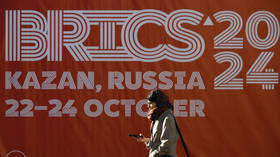Here’s why Russia’s BRICS presidency is at a critical crossroads

Among all the BRICS summits so far, the upcoming meeting under the Russian presidency is arguably the most important, as tensions over membership expansion could threaten the group’s cohesion, potentially ripping it apart. It will be challenging for Russia to carry on the work, taking over from South Africa and advancing the agenda of the Global South.
From October 22 to 24, Russia will host the 16th annual BRICS Summit in Kazan. After its largest expansion ever in 2023, international media reports suggest that an increasing number of developing countries are eager to join the group, raising the possibility of further expansion.
Some experts suggest that this surge of interest in joining BRICS is driven by FOMO or ‘fear of missing out’ on a prominent club with increasing visibility. This is important, especially when the doors of other US-led groupings are shut. For instance, several post-coup governments in Africa, which are seen in the West as unconstitutional, are banned from financial access to the IMF and World Bank. They view BRICS and its development bank as a viable alternative for support and cooperation.
When these countries’ leaders gather, the agenda of expansion will undoubtedly receive the highest priority. During last year’s expansion, member states had significant disagreements regarding the choice of members.
Each member country of BRICS has a vested interest in the bloc. With the US and its allies imposing various sanctions, Russia is eager to invite more friendly countries. An expanded BRICS with more friends inside will help Russia return to normalcy in international trade and investment, which has been restrained by US pressure.
Meanwhile, China’s relationship with the US – though it has not deteriorated in the last four years to the extent that occurred during the previous administration of President Donald Trump – has remained relatively stagnant. Nevertheless, China recognizes the need to engage with the West to sustain its growth and continues to be part of the Western economic system.
Therefore, by increasing the number of BRICS members, China would want to enhance its political influence. According to a number of experts, China aims to create a China-centric alternative world order, and BRICS represents another vehicle similar to the Shanghai Cooperation Organization (SCO).
Meanwhile, both India and Brazil have strengthened their ties with the US recently and will be cautious of being perceived as part of an anti-US grouping. This sentiment is somewhat shared by the Saudis and the UAE as well.
For New Delhi, it is more important, as India and China have several border disputes and are fighting for regional supremacy in one form or other. Indian experts think that Beijing will want to include more China-friendly, anti-India countries such as Pakistan to undermine New Delhi’s influence in the group. Some Indian experts also believe that New Delhi may consider a BRICS-exit in that scenario. As India already has bilateral relations with these countries, it stands to lose little.
It will fall under Russia’s leadership to break the ice between these two countries and prevent the group from disintegrating.
In any case, for India, being a member of BRICS also provides benefits, including having a platform to carry on its discussions with Russia and pursuing a more balanced stance, in the ethos of nonalignment.
However, as Iran has been included in the group, it increasingly resembles an anti-US bloc. Therefore, both India and Brazil will want discussions related to or introduced by Iran to be limited to the economic sphere, steering clear of political agendas.
South Africa finds itself in a relatively comfortable position. It is the biggest beneficiary of the African Growth and Opportunity Act (AGOA), giving its thousands of items duty-free access to the US market. Meanwhile, given its extensive coastline and naval security concerns, it has security arrangements with Russia and China. Further, South Africa was heavily criticized for its naval exercises with Russia and China last year. Although the country defends its actions as a matter of strategic autonomy and partnership choice, the timing, coinciding with the anniversary of the Russia-Ukraine conflict, has negatively impacted its reputation in the West.
This growing interest among developing countries in joining BRICS bodes well for the group. It will be intriguing to see how India navigates its interests amid China’s growing assertiveness, which frequently conflicts with Indian priorities. Only a more assertive India can ensure that BRICS does not evolve into a pro-China club.
The upcoming summit in Kazan will take place amid several global crises: The Russia-Ukraine conflict, the escalating crisis in the Middle East, and change of governments in several African countries. The uncertainty looming over this year’s US presidential election further complicates the situation. This year’s event will also mark the first gathering of the expanded BRICS.
For Russia, this year’s summit is an opportunity to show that it is not as cornered as the West wants to project. On the contrary, Russia seeks to reaffirm its continued relevance on the global stage by inviting leaders from India, China, South Africa, and Brazil.
Despite some doomsday predictions, BRICS has so far managed to survive and thrive. However, it is now at a crossroads where one wrong move could crumble it like a pack of cards. A lot will depend on how Russia handles its partner countries in the Global South.
The statements, views and opinions expressed in this column are solely those of the author and do not necessarily represent those of RT.
















